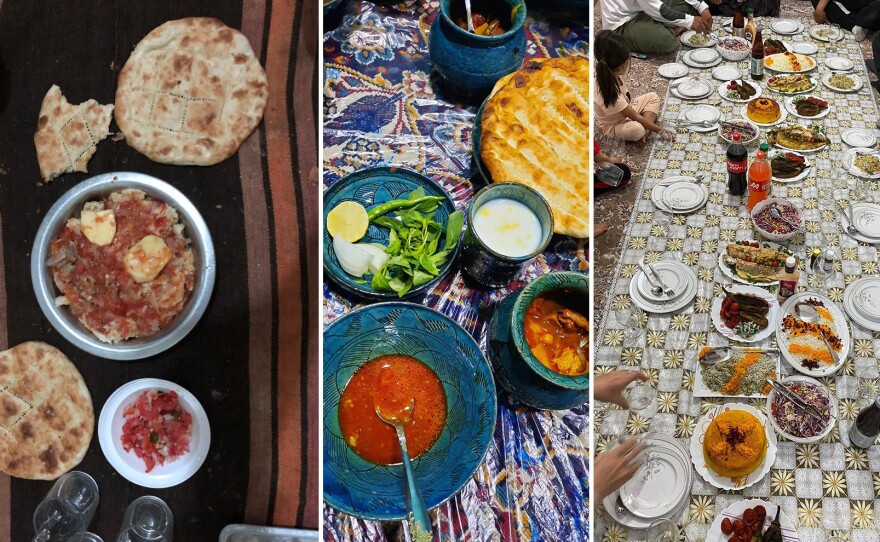In January 2021, Yahya Rasa returned home with pride to Kabul, Afghanistan. A boisterous celebration and an elaborate meal of Afghan delicacies awaited him after completing his master's degree in business management in Malaysia. "Being the first person in my family to secure a master's degree from abroad, I was a role model to my siblings and even my friends," the 25-year-old says.
Over a year and half later, and nearly a year after the August 2021 Taliban takeover of Afghanistan that led to widespread unemployment and poverty, Rasa struggles to find a job and support himself and his new bride.
He's reminded of all this every time he sits to eat at his family's traditional dining rug, or dastarkhaan in Persian. Where once was a generous spread of Afghan dishes like qabli pulao, a dish of meat and rice with carrots, raisins and other dry fruits; mantus and aashak, Afghan dumplings stuffed with meat and vegetables, respectively; and fresh seasonal fruits, today "most of our meals [are] very basic, like kidney beans or potatoes or lentils," Rasa says.
"There have also been times that the only food we had was bread and tea. It feels like [the] dastarkhaan is always empty."
Rasa is one of nearly 20 million Afghans struggling to put food on the dastarkhaan, according to a May report by the International Rescue Committee. Afghanistan's economy crashed after the 2021 takeover, exacerbating steep increases in poverty that already had occurred because of COVID-19 and droughts, says Lutfi Rahimi, an economics professor at the American University of Afghanistan. Earthquakes last month killed hundreds and added to the country's suffering.
The crisis is also affecting Afghans from the middle class who are now plunged into a lower class because the jobs they relied on have evaporated, Rahimi says. Several of these former professionals told NPR that they make no money and survive because of humanitarian aid, charity or by selling possessions like furniture. "Poverty did not happen overnight, but the collapse made the already failing situation even worse," Rahimi says.
A central part of the Afghan home
The dastarkhaan holds a special significance in Afghan culture, explains Mina Sharif, an Afghan media consultant who produces radio and television programming, including two seasons of the Afghan "Sesame Street". Now based in Canada, Sharif volunteers with Aseel, an organization that helps provide food and care packages to Afghans in need. "A dastarkhaan is where Afghan families connect with each other, their community and also the guests of their country," Sharif says.
Like a family dining table, the dastarkhaan holds meals, fruits and desserts every day. It is prominent across Central Asia and the Middle East. Special dastarkhaan preparations are common during Islamic feast days and holidays, Persian new year or when hosting guests. For Afghans, the dastarkhaan is an expression of hospitality and respect to guests and ideally is colorful and overflowing with food, akin to U.S. Thanksgiving spreads. "If you've been invited to an Afghan home and sit with them on the dastarkhaan to break bread with them, you are considered one of the family," Sharif says.
Learning to live with less
Like Rasa, many people who were previously able to afford a generous dastarkhaan, or at least a satisfactory meal, have now found themselves unable to do so.
The prior Afghan government was not only a big economic contributor but also a big employer, Rahimi explains. "The military and security apparatus alone employed over half a million Afghans. All these jobs vanished overnight, and people lost their income," he said, adding that the private sector in Afghanistan is a small fraction of the economy unlike that of the West.
A female journalist, who asked to be identified only by her initials F.S. to protect her from possible Taliban persecution, says that her brother, a former civil servant, was repeatedly threatened by the Taliban and fled the country. She once paid for her own schooling and, with her brother, supported a family of five, including her parents and siblings. When the Taliban took control of her province, the majority of the women journalists were removed from their jobs, and the girls' school where she taught was closed. "Before August 2021, we were a two-income household and could afford small luxuries" like new clothes and celebratory meals, F.S. said, describing her family's once glorious dastarkhaans. In stark contrast, for the last Eid holiday in May, all the family had were some beans along with a small portion of meat shared by a neighbor. "Today, I can't even pacify my younger siblings when they cry for food," F.S. says. "It is hard for children to understand what poverty is."
Projects undertaken by Mohammad Modares's construction company in Daikundi province were halted when the Taliban took control, because banks stopped functioning and people couldn't afford construction. His business lost all its income and he let go of his staff. A small family farm barely provides enough to feed his parents, siblings, wife and daughter in his village.
"Our dastarkhaan has changed a lot in less than a year. We use potatoes and beans instead of meat. We do not eat fruits," he says. The family cannot even afford clean drinking water, he adds.
Modares used to make close to $250 every month, a middle-class income in Afghanistan. He moved to Kabul on his own four months ago, staying with friends while seeking a job to repay his debts. He has applied for over 50 positions but hasn't received a response. Hundreds, if not thousands, of people apply for every job opening, Rahimi says.
Modares, who is living on the last of his savings, survives on one small meal a day, often potato fries or bread with tea. "I have to pay for my own costs in the city, and send money to my wife and daughter," he says. "I try to eat less and only cheap things."
Also in Kabul, Rasa, the recent master's graduate, is feeling the crisis take a toll on his mental health. "Sometimes it gets so hard that I think life isn't worth living and I think about suicide," he admits. "I have applied for many jobs but even with [a] foreign degree and good grades I can't land even a small position," he laments. "What good is this education when I can't even feed my family?" Yet he keeps trying to find work, buoyed by the hope that he will once again experience a dastarkhaan laden with delights.
Zuhal Ahad is an Afghan journalist covering stories of conflict and development in Afghanistan, with a special focus on women and marginalized communities.
Ruchi Kumar is a journalist who reports on conflict, politics, development and culture in India and Afghanistan. She tweets at @RuchiKumar
Copyright 2022 NPR. To see more, visit https://www.npr.org. 9(MDAzMjM2NDYzMDEyMzc1Njk5NjAxNzY3OQ001))






